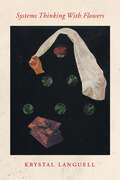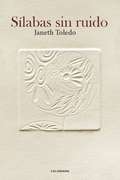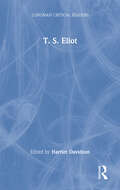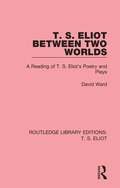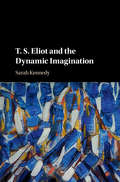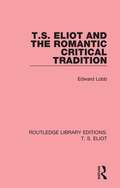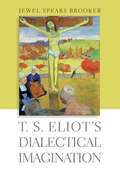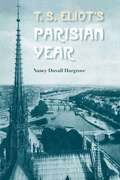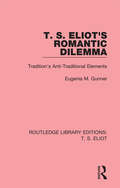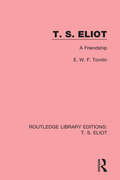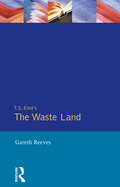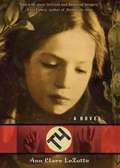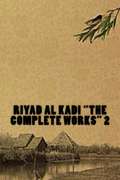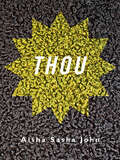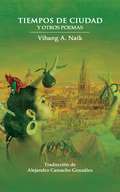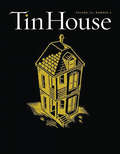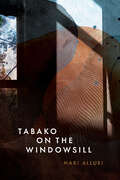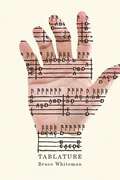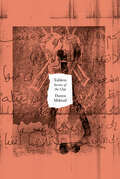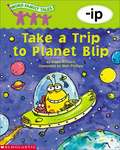- Table View
- List View
Systems Thinking With Flowers
by Krystal LanguellA poetry collection about conspiring to do right within the constraints of inherited structures, Systems Thinking with Flowers critiques unearned authority in its many guises. In two sections, the book chronicles the complex emotional gymnastics required for existence in male-dominated and colonialist environments, such as professional sports, museums, and other institutions.
Sílabas sin ruido
by Janeth ToledoUn poemario que surge desde el verbo que se hace en silencio, en íntima comunión con su cuerpo y la naturaleza. Desde hace más de veinte años y hasta el día de hoy -cuando al parecer ha fijado ya su residencia definitiva en la tierra- Janeth Toledo ha vivido en distintos parajes del Valle de los Chillos en los cuales ha afinado su percepción y comprensión de la naturaleza. En ese diálogo con el paisaje -entendido como espacio de meditación y reflexión- Janeth encuentra buena parte de los elementos con los que construye sus poemas: sutiles visiones del entorno en las que proyecta sus emociones y su memoria, o al revés: el caudal de su experiencia afectiva transformando y resignificando el paisaje que habita. «Después de la lloviznatodo campo es más verdebrilla la hojay en su nervadura late febrilel pulso de la vida.» En el filón creativo de los poetas románticos, la autora interioriza la naturaleza, la hace pasar por su cuerpo y sus afectos para devolverla al lector trastocada, en forma de imágenes reveladoras, elocuentes en su laconismo y en su sigilo. Si sus palabras «nacen en la opacidad», su voz ruge «en el primer aliento / de las valvas». Esta hermosa imagen inaugural acaso resuma su dicción y su verdad: traducir el grito del cuerpo a una lengua de secretos y murmullos, decir la vida a través de las pequeñas hendiduras del cuerpo, aquellas que abren el sexo y los sentidos, nuestros más precisos instrumentos de conocimiento y de comunicación. Con este pequeño, íntimo, entrañable poemario, Janeth Toledo debuta en la poesía para cantar en voz baja y eficaz las profundas certezas e incertidumbres que no invaden ahora mismo. Hay que apegarla oreja para escuchar su rugido. Cristóbal Zapata
T is for Turkey: A True Thanksgiving Story
by Tanya Lee StoneLittle ones will love learning about Thanksgiving in Tanya Lee Stone's newest shaped alphabet book. Join in as the elementary school puts on a play that tells the true story of the first Thanksgiving. Rhyming couplets that flow through the alphabet help kids celebrate everything from Harvest to Pilgrims to Turkey.
T. S. Eliot (Longman Critical Readers)
by Harriet DavidsonOne of the most influential poets of the twentieth century, T. S. Eliot is generally regarded as a leading exponent of the literary movement which came to be known as Modernism. In this volume, Harriet Davidson collects key recent essays by such internationally renowned critics as Terry Eagleton, Sandra Gilbert, Jacqueline Rose, Jeffrey Perl, Christine Froula, Maud Ellmann, and Michael North, placing Eliot's work centrally in the context of postmodern critical theory.Eliot's writing is often perceived as incompatible with or resistant to new theoretical approaches, but this volume demonstrates the continuity between Eliot's own theoretical writings and contemporary theory, and illuminates his poetry with imaginative readings from deconstructive, Marxist, psychoanalytic, and feminist perspectives. Headnotes to the essays and a bibliography which lists other informative readings make this book an invaluable guide to all students of twentieth-century poetry, and to scholars interested in the relationship between critical and creative writing.
T. S. Eliot Between Two Worlds: A Reading of T. S. Eliot's Poetry and Plays (Routledge Library Editions: T. S. Eliot #10)
by David WardThe basis of this critical examination of Eliot’s work, first published in 1973, is the investigation of his transmutation of this and other philosophical, mythological and religious motives into the textures of his verse. This book focuses on Eliot’s peculiar eclectic approach to what he described as ‘the Tradition’. It also recognises the fact that Eliot, for all his attempts at universality, was a product of time and place, and gives an account of the way in which his education and experience shaped his most important interests. This title will be of interest to students of literature.
T. S. Eliot and the Dynamic Imagination
by Sarah KennedyHow is a poem made? From what constellation of inner and outer worlds does it issue forth? Sarah Kennedy's study of Eliot's poetics seeks out those images most striking in their resonance and recurrence: the 'sea-change', the 'light invisible' and the 'dark ghost'. She makes the case for these sustained metaphors as constitutive of the poet's imagination and art. Eliot was haunted by recurrence. His work is full of moments of luminous recognitions, moments in which a writer discovers both subject and appropriate image. This book examines such moments of recognition and invocation by reference to three clusters of imagery, drawing on the contemporary languages of literary criticism, psychology, physics and anthropology. Eliot's transposition of these registers, at turns wary and beguiled, interweaves modern understandings of originary processes in the human and natural world with a poet's preoccupation with language. The metaphors arising from these intersections generate the imaginative logic of Eliot's poetry.
T. S. Eliot and the Romantic Critical Tradition (Routledge Library Editions: T. S. Eliot #5)
by Edward LobbEdward Lobb’s study, first published in 1981, is a thorough examination of Eliot’s relation to Romantic criticism. This title also makes extensive use of Eliot’s Clark Lectures on metaphysical poetry. Delivered in 1926, the lectures complete the picture of literary history set out in Eliot’s published work, and are, the author believes, essential to a full understanding of the poet’s ideas and their place in tradition. Drawing on a wide variety of primary sources and earlier scholarship, T. S. Eliot and the Romantic Critical Tradition will be of interest to students of literature.
T. S. Eliot in Context
by Jason HardingT. S. Eliot's work demands much from his readers. The more the reader knows about his allusions and range of cultural reference, the more rewarding are his poems, essays and plays. This book is carefully designed to provide an authoritative and coherent examination of those contexts essential to the fullest understanding of his challenging and controversial body of work. It explores a broad range of subjects relating to Eliot's life and career; key literary, intellectual, social and historical contexts; as well as the critical reception of his oeuvre. Taken together, these chapters sharpen critical appreciation of Eliot's writings and present a comprehensive, composite portrait of one of the twentieth century's pre-eminent men of letters. Drawing on original research, T. S. Eliot in Context is a timely contribution to an exciting reassessment of Eliot's life and works, and will provide a valuable resource for scholars, teachers, students and general readers.
T. S. Eliot's Dialectical Imagination (Hopkins Studies in Modernism)
by Jewel Spears BrookerWhat principles connect—and what distinctions separate—"The Love Song of J. Alfred Prufrock," The Waste Land, and Four Quartets?The thought-tormented characters in T. S. Eliot’s early poetry are paralyzed by the gap between mind and body, thought and action. The need to address this impasse is part of what drew Eliot to philosophy, and the failure of philosophy to appease his disquiet is the reason he gave for abandoning it. In T. S. Eliot’s Dialectical Imagination, Jewel Spears Brooker argues that two of the principles that Eliot absorbed as a PhD student at Harvard and Oxford were to become permanent features of his mind, grounding his lifelong quest for wholeness and underpinning most of his subsequent poetry. The first principle is that contradictions are best understood dialectically, by moving to perspectives that both include and transcend them. The second is that all truths exist in relation to other truths. Together or in tandem, these two principles—dialectic and relativism—constitute the basis of a continual reshaping of Eliot’s imagination. The dialectic serves as a kinetic principle, undergirding his impulse to move forward by looping back, and the relativism supports his ingrained ambivalence. Brooker considers Eliot’s poetry in three blocks, each represented by a signature masterpiece: "The Love Song of J. Alfred Prufrock," The Waste Land, and Four Quartets. She correlates these works with stages in the poet’s intellectual and spiritual life: disjunction, ambivalence, and transcendence. Using a methodology that is both inductive—moving from texts to theories—and comparative—juxtaposing the evolution of Eliot’s mind as reflected in his philosophical prose and the evolution of style as seen in his poetry—Brooker integrates cultural and biographical contexts. The first book to read Eliot’s poems alongside all of his prose and letters, T. S. Eliot’s Dialectical Imagination will revise received readings of his mind and art, as well as of literary modernism.
T. S. Eliot's Parisian Year
by Nancy Duvall HargroveAfter graduating from Harvard in 1910, T. S. Eliot spent a year in Paris, and his experiences there had a profound and lasting influence upon his life and his work. Even so, most scholars and biographers ignore it, mention it only in passing, or, in rare cases, dismiss it as a typical post-graduation year any wealthy student of the time could have had. <P><P> Nancy Hargrove sets the record straight on just how vitally important this period was for the young man. She meticulously re-creates the city and discusses in detail how pre-war Parisian culture influenced the works Eliot later produced. Hers is the first in-depth study of this crucial but largely overlooked year in the life of the artist, and reveals the complex repercussions it had on his literary career. <P><P> Nancy Duvall Hargrove, author of Landscape as Symbol in the Poetry of T. S. Eliot, is William L. Giles Distinguished Professor Emerita of English at Mississippi State University.
T. S. Eliot's Romantic Dilemma: Tradition's Anti-Traditional Elements (Routledge Library Editions: T. S. Eliot #4)
by Eugenia M. GunnerThe fact that Eliot disapproved of Romanticism is clear from his critical essays, where he often appears to reject it absolutely. However, Eliot’s understanding of the term and his appreciation of literature developed and altered greatly from his adolescence to his years of scholarly study, yet he was never unable to dismiss Romanticism entirely as a critical issue. This study, first published in 1985, analyses Eliot’s approach and criticism to Romanticism, with an analysis of The Waste Land, adding to the layers of its meaning, context and content to the poem. This title will be of interest to students of literature.
T. S. Eliot: A Friendship (Routledge Library Editions: T. S. Eliot)
by Frederick TomlinFirst published in 1988. Fredrick Tomlin and T. S. Eliot were friends for almost thirty-four years. What emerges from Fredrick Tomlin’s memories and the many letters which passed between them is a private Eliot, seen only by his closest family and a trusted few. Tomlin evokes the man as he was – quite different in his humanity and in his humour from the public image of the ‘great poet’ and the austere sage. With fresh insights and personal testimony, Tomlin directs light onto aspects of Eliot’s character and personality of which the public has been unaware, thereby enhancing the reader’s appreciation of Eliot’s work as a whole. This title will be of interest to students of literature.
T. S. Elliot's The Waste Land
by Gareth ReevesThis work argues that although "The Waste Land" demands close reading, the spirit of the old New Criticism works with inappropriate assumptions about unity and closed form. Many critics have tried to fix the text, to find hidden narratives and plots, spiritual guests and allegories of salvation. Instead, this reading sees the poem as resolutely open-ended, supporting this view with recent developments in Reader-Response criticism and Reception Theory. The study focuses on the way poetry sounds (or does not sound, cannot be sounded). It concentrates on syntax, lineation and intonation. It also brings out the presence of the muted voices of wronged women in a work often called misogynistic.
T4
by Ann Clare LezotteIt is 1939. Paula Becker, thirteen years old and deaf, lives with her family in a rural German town. As rumors swirl of disabled children quietly disappearing, a priest comes to her family’s door with an offer to shield Paula from an uncertain fate. When the sanctuary he offers is fleeting, Paula needs to call upon all her strength to stay one step ahead of the Nazis.
THE COMPLETE WORKS 2: Riyad Al Kadi
by Riyad Al Kadi Mahmoud AbdulbaseerThi is the second volume of the completes works of Riyad Al Kadi. It contains poems about love and other related themes.
THE ONE AND THE MANY
by Rabindranath Tagore Ketaki Kushari Dyson William Radice John BerridgeThis elegant volume of Tagore's poems, translated, is copiously illustrated by colour photographs from John Berridge, Professor of Religion at Xavier University, Antigonish, Canada. William Radice, who has translated Tagore for years, is a Professor at the School of Oriental and African Studies at the University of London. He is also a poet in his own right. The second translator, Ketaki Kushari Dyson, was born in Calcutta in 1940 and educated at Calcutta and Oxford. In 1963 she became the first Indian woman to gain a First in English Literature at Oxford. She also has a doctorate from Oxford. Based in Britain since her marriage to an Englishman, she maintains close links with the literary life of her native city and is regarded as a significant Bengali writer of her generation.
THOU
by Aisha Sasha JohnIn THOU, Aisha Sasha John knows the day – biblically. What if time itself was an object of desire? And the book was a theatre for that? Aisha Sasha John has a crush on time. Which is why she discipled in it. For three years. Also for three months. Also for three months at 33. Ya. Aisha Sasha John has a crush on time and discipled in time, moving it across her body, watching it, um, course the day. She slowed it down and thought along it, she cut it up. She slowed it down and thunk along it and sped it up. She cut it up and spaced it out and rhythmed it down and laid it flat and looked at it hard. Aisha Sasha John has a crush on time. She did it. She did time. It was gross and funny and it was hard and it was good. The result is/was – THOU.
TIEMPOS DE CIUDAD Y OTROS POEMAS
by Vihang A. Naik Alejandro Camacho GonzálezVihang A. Naik arroja luz sobre la vida de una ciudad inmersa en sombras, gloria y miseria en Tiempos de ciudad y otros poemas. Se trata de una antología con sus poemas más intuitivos y filosóficos, dividida en seis partes: Canción de amor de un viajero es casi un cuaderno de bitácora; Hombres reflejados transciende las quimeras de la ciudad, en la que las gentes son volubles como el caminar de un cangrejo o los colores de un camaleón; El sendero de la sabiduría comprende los inicios de la meditación y el conocimiento; En la orilla recoge las sensaciones de futilidad, recuerdos, dolor, exilio y alienación del poeta en la orilla de la vida. El título de esta colección alude también a la última sección del poemario, en el que la ciudad se despliega como un mercado, como un cielo para los desalmados, como aljófares de cambio, y es observada en la penumbra, a medianoche, bajo la luz de la luna y a través del vaho y la niebla El poema "Autorretrato" comienza con un bosquejo esquemático, incluyendo siete páginas en blanco, donde el lector encuentra unas palabras sobre el final del poema. Aquí, el poeta visualiza, en un momento de epifanía, la verdadera naturaleza del yo cuando despierta y ve su "yo/ revelado más allá del pensamiento". Entre "Yo¨" y "revelado más allá del pensamiento" hay 5 páginas en blanco. La inefable epifanía de lo ambiguo. Puede sugerir el descubrimiento de un yo transcendental allende todo pensamiento y lenguaje, o quizás el descubrimiento de una Ausencia lejos del habla y pensamiento humanos. Reseñas: "La lectura de Tiempos de ciudad y otros poemas es una experiencia embriagadora y reveladora" - Readers' Favorite "Apuntando hacia la filosofía, incluso aspectos existenciales, estos versos amigos de lo ajeno dejan demasiado en lo no dicho." - Kirkus Reviews "Una obra recomendable y única." - Cate Baum
Tabako on the Windowsill
by Hari AlluriAn altar is a door; wonder is the key.What losses and intimacies bring you to this threshold? Tabako on the Windowsill contends tenderly with such questions, initiating through them the work of transformation. To shape an entire book around portals and thresholds is to search for living myth. Hari Alluri’s poems build from comic books, television, paintings, folklore, music, and a unique imagination. Following an immigrant point of view while maintaining home in a language that engages with blood and chosen family, Alluri offers multiple lived and ancestral spacesin India, the Philippines, Nigeria, the U.S., and Canada. Guided by a burning attention – to braids of displacement, loss, and joy, to multiple beginnings – Alluri creates moments where we can expand through the personhood of perception into wider, overlapping worlds of perspective and possibility.
Tablature
by Bruce WhitemanFrom the "rubble [that] is the order of the day" in the opening poem to the longing for a "radiant happy ending" in the book's final line, Tablature is a book of poems that traverses a great swath of the heart's experience in compelling and lucid poetic language. Bruce Whiteman's first book of poems in traditional lined form in thirty years is by turns learned and allusive, and emotionally expressive and despairing. These poems engage three large and powerful subjects: the landscapes we see and abide in, music that is comforting and a guide to hearing the poem's compulsions, and love - erotic, domestic, and enduring. Whiteman is keenly observant of the natural world of birds and trees, of rocks and water, alive to the pressures and hurts of daily life, and above all to the ways in which music rescues us from dependency and pulls us back from a "cultivated hysteria. " If there is an "intimate / apocalypse," there is also "radiant hope. " The poems in Tablature capture readers with their singular music and their bright and unblinking takes on the quotidian challenges of living a life. These are poems of a highly tuned sensibility matched by a sweetness of language.
Tablature (The Hugh MacLennan Poetry Series #31)
by Bruce WhitemanDazzling poems about landscape, music, and the course of love that go straight to the heart.
Tablets: Secrets Of The Clay
by Dunya MikhailA gorgeous fusion of poetry and image by “one of the foremost poets of our time” (The Christian Science Monitor). “A bullet / then a siren / then ruins / then a bird song telling the truth”—Dunya Mikhail In her marvelous new poetry collection Tablets: Secrets of the Clay, Dunya Mikhail transforms the world’s first symbols—Sumerian glyphs that were carved onto clay tablets—into the matter of our everyday contemporary life. Each of the ten sections in her book is composed of twenty-four short poems, and each poem combines both text and drawing. In her note to the collection, Mikhail writes, “I practiced at least two layers of translation in these tablets: the first from words in one language, Arabic, to another, English; and the second from words to images. What I received from my ancestors are offerings of the future rather than of the past. Now it’s my turn to offer them to you.”
Take A Trip To Planet Blip (Word Family Tales™ -ip)
by Kama Einhorn Matt PhillipsJump in our spaceship and take a trip--all the way to planet Blip! You'll giggle at the wacky way of life on this out-of-this-world planet! WORD FAMILY TALESTM are humorous read-aloud stories created to build early phonics skills by teaching children to recognize "families" of words that share the same spelling pattern. This key reading strategy helps kids decode new words with ease--and become stronger readers, writers, and spellers. Set learners on the path to literacy success with these rib-tickling tales--one for each of the top 25 word families!
